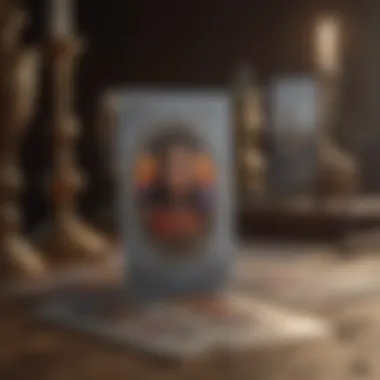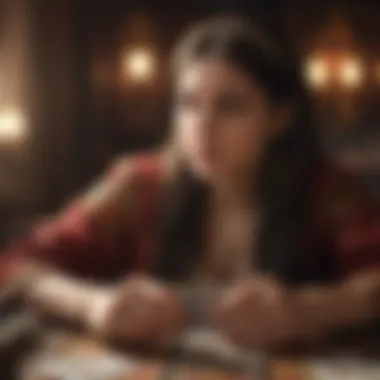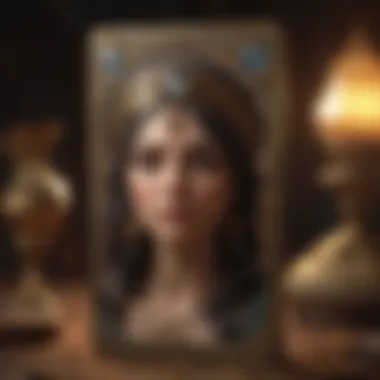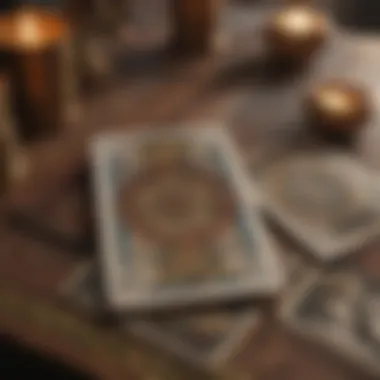Using Tarot for Career Insights and Guidance


Intro
The world of tarot extends beyond its mystical allure and esoteric practices; it intertwines with everyday life decisions, especially those related to careers. For many, the path to professional fulfillment feels like navigating through thick fog. Tarot can serve as a beacon, illuminating potential pathways and clarifying uncertainties. This article ventures into how tarot can unlock insights into career development, providing you with the tools needed to utilize tarot not just for self-reflection, but also as a method for informed decision-making in your professional life.
Characteristics of Each Zodiac Sign
Understanding the personality traits associated with each Zodiac sign offers a deeper perspective when conducting tarot readings. Your astrological sign can significantly influence your career inclination and approach to work. Here’s a closer look at the key characteristics tied to each sign:
Overview of Personality Traits
- Aries: Ambitious and energetic, Aries folks are natural leaders. Their go-getter attitude drives them toward positions of authority.
- Taurus: With a penchant for stability, Taureans thrive in secure environments, often finding satisfaction in finance or strong corporate structures.
- Gemini: Adaptive and communicative, those born under Gemini can excel in sales or creative fields, leveraging their versatility.
- Cancer: Empathetic and nurturing, Cancerians often find fulfillment in caretaking roles, whether in healthcare or education.
- Leo: Charismatic and confident, Leos often gravitate toward public roles, thriving on recognition and leadership.
- Virgo: Detail-oriented and analytical, Virgo individuals often excel in research or administrative roles where precision is key.
- Libra: Known for their diplomacy, Librans can adeptly navigate roles in human resources or mediation.
- Scorpio: Intense and transformative, Scorpios tend to thrive in investigative roles, often found in psychology or detective work.
- Sagittarius: Adventurous and philosophical, Sagittarians often seek careers that allow for travel or exploration, such as consultancy or travel writing.
- Capricorn: Disciplined and methodical, Capricorns find satisfaction in managerial positions, often climbing the corporate ladder with persistence.
- Aquarius: Innovative and idealistic, Aquarians often excel in technology and humanitarian roles focused on societal betterment.
- Pisces: Intuitive and creative, Pisceans often thrive in artistic fields or roles that require emotional intelligence.
Strengths and Weaknesses
- Aries: Strengths include courage and leadership; weaknesses can be impulsiveness.
- Taurus: Strong determination and reliability; weaknesses may relate to stubbornness.
- Gemini: Their adaptability is a strength, but they can sometimes lack focus.
- Cancer: Caring nature is a strength, but they may struggle with self-doubt.
- Leo: Confidence drives them; arrogance can sometimes derail teamwork.
- Virgo: Attention to detail boosts their work, while overthinking can inhibit progress.
- Libra: Diplomacy is a strength; indecisiveness can hinder timely decisions.
- Scorpio: Their passion ignites projects; their intensity can be overwhelming.
- Sagittarius: A thirst for knowledge is empowering; avoidance of routine may disrupt stability.
- Capricorn: Their strategic thinking aids in success, although they can be overly critical.
- Aquarius: Innovative thinking leads the way; unpredictability can create chaos.
- Pisces: Their empathy is a huge asset, but they may struggle with boundaries.
Compatibility with Other Signs
Career paths are often collaborative, and understanding sign compatibility can enhance workplace dynamics:
- Aries often finds harmony with Leo and Sagittarius, leading to dynamic teams.
- Taurus may click well with Virgo and Capricorn for a grounded approach.
- Gemini can collaborate well with Libra and Aquarius due to their shared adaptability.
- Cancer's nurturing nature often aligns well with Pisces and Scorpio in supportive roles.
- Leo shines best in partnerships with Aries and Sagittarius for creative projects.
- Virgos find strength in partnerships with Taurus and Capricorns.
- Libras thrive alongside Gemini and Aquarius for balanced teamwork.
- Scorpios often work productively with Cancer and Pisces in more intuitive roles.
- Sagittarius engages best with Aries and Leo in dynamic environments.
- Capricorns drive results alongside Taurus and Virgo.
- Aquarius will flourish with Gemini and Sagittarius, fostering innovation.
- Pisces may find a nurturing bond with Cancer and Scorpio in empathic roles.
By understanding these characteristics and their implications, tarot can be intricately linked to career guidance, allowing individuals to lean into their strengths and seek paths that truly resonate with their nature.
Preamble to Tarot and Career Decisions
In a world where career paths often feel like navigating a labyrinth, individuals may seek guidance from various sources. One such source, often overlooked, is the practice of tarot. Tarot isn’t just about mysticism; it offers a reflective tool that can assist in unraveling questions regarding one’s career. It can illuminate underlying thoughts, feelings, and possible outcomes related to employment decisions and aspirations.
The intersection of tarot and career choices invites a deeper exploration, encouraging a dialogue not just about what the future holds but also about self-awareness and personal growth. The cards, rich in symbolism, can reflect the contexts and complexities of modern work-life, coaxing out insights that might otherwise remain shrouded in uncertainty. Utilizing tarot can help one to comb through the noise, directing attention toward choices aligned with personal values and ambitions.
Understanding Tarot as a Divination Tool
Tarot operates on the premise that every card drawn conveys a message, a piece of the larger puzzle of one's situation. Each card, whether it is striking like The Tower or hopeful like The Sun, presents multiple interpretations that weave together personal narratives. By engaging with tarot as a divination tool, one can foster a greater understanding of their career objectives. It's not about predicting a fixed outcome; rather, it's an opportunity to reflect on different paths and possibilities.
Just as in life, where decisions are influenced by myriad factors, so too do the cards echo the nuances of choice. The tarot deck becomes a mirror, reflecting both conscious and subconscious influences that can shape career trajectories. This allows individuals to confront fears, aspirations, and constraints and to imagine an array of potential futures.
Relevance of Tarot in Modern Career Planning
The relevance of tarot today cannot be denied, especially as people navigate an ever-evolving job market. With the rise of gig economies and a shift toward flexible job structures, many find themselves at crossroads more frequently than ever.
In this context, tarot proves to be a valuable ally. It serves as a form of introspective guidance, encouraging individuals to explore their thoughts on career changes, job satisfaction, and prospective opportunities.
Consider the roles played by the cards in unpacking complexities:
- Clarifying Ambivalence: When uncertain about a job prospect, certain cards may highlight sentiments of stability or caution, prompting a dialogue on whether the decision aligns with personal values.
- Highlighting Opportunities: Some cards embody fortune and growth, providing motivation to pursue new paths when those vibrations surface.
- Acknowledging Challenges: Conversely, cards indicating strife could underscore necessary adjustments or negotiations needed in one's current role or during a job hunt.
In essence, tarot fosters an environment of reflection, allowing individuals to sift through the noise of modern pressures and to clarify their career intentions. With its rich history and myriad applications, tarot offers a unique space for career exploration that validates both personal experience and professional aspirations.
"Tarot acts not just as a guide for the future, but as a bridge to understanding the present."
The Historical Context of Tarot
Understanding the historical context of tarot reveals a tapestry rich in cultural significance and practicality. This exploration guides us in appreciating not just the cards themselves, but also the evolution of how they’ve been applied as tools for decision making, including career choices. Unpacking this history is fundamental, as it contextualizes contemporary uses of tarot in a world that increasingly seeks intuitive guidance in professional contexts.
Origins of Tarot Cards
Tarot cards hail from an era long before they became associated with fortune-telling. They originated in the 15th century in Europe, primarily as a card game known as tarocchi. In this early phase, the cards were not imbued with mystical meaning; instead, they served as mere entertainment among the aristocracy. The imagery depicted was a blend of medieval symbolism and artwork that reflected the culture of the time, combining the playful with the profound.
One can trace their lineage back to various influences, particularly from the Mamluk decks imported into Europe from the Islamic world. The incorporation of exotic designs and motifs created a unique fusion that paved the way for later interpretive models. This roots background is not just of historical interest; it lays the groundwork for how tarot is perceived today, particularly as a tool for self-reflection and decision-making in career contexts.
Evolution of Tarot over Centuries
The transformation of tarot from card games to divination tools unfolded gradually. By the 18th century, figures such as Jean-Baptiste Alliette began to associate tarot with esoteric wisdom, thus changing its narrative considerably. The cards began to be viewed as gateways to understanding one's life path, not just in personal matters but increasingly in professional domains as well.


Various styles and decks emerged over this period, each bringing its unique interpretations and symbols. Some significant tarot decks include the Rider-Waite, known for its vivid imagery and associations with the psyche, and the Thoth Tarot, influenced by Kabbalistic principles. These decks elucidated meanings that went beyond simple fortune-telling; they presented complex archetypes that resonate with one’s personal and professional journey.
As the 20th century arrived, the tarot became a staple in the realm of spirituality and self-discovery. Individuals began to seek out tarot readings for clarity in career decisions, divining paths that aligned more closely with their authentic selves. This marked a significant shift, as tarot readings would now inform not only individual aspirations but broader career trajectories.
The history of tarot reflects a broader human journey—a quest for meaning and direction in an often chaotic world.
Through its evolution, tarot has not merely survived but adapted to audience needs, evolving alongside humanity’s shifting paradigms. As we examine tarot's historical context, we glean insights that can infuse our career guidance with a deeper sense of purpose and understanding.
Tarot Card Structure and Meaning
Understanding the structure and meaning of tarot cards forms the backbone of interpreting them in the context of career guidance. This section emphasizes how the two main categories within tarot—Major Arcana and Minor Arcana—affect our perception and application of cards when navigating job inquiries. The tarot deck, seldom merely seen as a mystical artifact, serves as a powerful reflection of our inner thoughts, ambitions, and struggles. This insight proves indispensable for anyone looking to leverage tarot as a tool for career decision-making.
Major Arcana and Career Insights
Major Arcana cards are often viewed as the heavy hitters in the tarot world. They carry profound meanings and are often associated with significant life events and overarching themes. When considering career aspects, these cards don’t just point to specific jobs—they can reflect your life's journey, pivotal changes, and the lessons learned along the way.
For instance, the Fool card symbolizes new beginnings, embodying a spirit of adventure and potential without fear of failure. This card may surface for someone contemplating a career change or considering an industry entirely new to them.
Similarly, the Wheel of Fortune reflects cycles of life, emphasizing that careers often have ups and downs. When this card appears, it could signal timing; perhaps now is the moment to seize opportunities—or prepare for potential setbacks.
The impact of Major Arcana cards extends beyond mere job selection; they challenge the querent to think about their motivations and desires. Reflecting on these cards can lead to deeper self-awareness, which ultimately influences decision-making processes in a career context. In short, Major Arcana cards are not just signals but potent archetypes urging us to consider the bigger picture in our career landscape.
Minor Arcana: Everyday Relevance
While the Major Arcana outlines the grand narrative of one’s career journey, the Minor Arcana focuses more on the everyday facets of life, including tasks and challenges often related to the workplace. The Minor Arcana consists of four suits: Cups, Pentacles, Swords, and Wands, each embodying different aspects of professional life and day-to-day decision-making.
For example, Cups are associated with emotions and interpersonal relationships, which play a critical role in workplace dynamics. If you draw the Three of Cups, it could suggest the importance of teamwork or finding joy in your current position. It highlights the need for positive connections and collaboration with colleagues, which can tremendously influence your career satisfaction.
On the other hand, Pentacles relate to material wealth and the physical aspects of one’s career. Drawing the Seven of Pentacles may encourage reflection on past efforts and assess their returns; it’s an invitation to consider whether your current job brings you satisfaction and aligns with your long-term career goals.
Swords often point to conflict or challenges. For instance, the Five of Swords might indicate workplace strife and the need for careful navigation of conflicts. Finally, Wands represent action, ambition, and creative endeavors; cards like the Ace of Wands signal new opportunities that spark motivation in your job.
In summary, while Major Arcana cards weave together a person’s career story, the Minor Arcana provide practical guidance and address daily realities. Therefore, both types of cards serve vital roles when seeking insights into one’s career path. Integrating their meanings into career consultations allows for a balanced perspective, ensuring that both the broader narrative and the details are appropriately considered in decision-making.
"Tarot's rich tapestry—woven with the threads of the Major and Minor Arcana—creates a dynamic approach, guiding seekers through the complexities of career choices."
Preparing for a Tarot Reading Focused on Careers
Preparing for a tarot reading centered around career decisions is a fundamental step that can dramatically shape the effectiveness of the insights gained. While tarot is often seen as just a mystical practice, the importance of preparation can't be overstated. When done right, it serves not only to provide clarity but also to enhance the connection between the seeker and the cards. In this section, we’ll dive into two essential components: setting intentions and creating a conducive environment.
Setting Intentions for Your Reading
Setting intentions is akin to charting a course before embarking on a journey. When you approach tarot with a clear focus, you're more likely to draw out relevant messages that address your career questions. Start by reflecting on what you genuinely seek to understand or gain from the reading. Are you looking for a new job, guidance for a potential promotion, or insights into a shift in your career path? Asking yourself these questions lays the groundwork for a meaningful experience.
Here are some practical tips for setting your intentions effectively:
- Be Specific: Instead of a vague desire for guidance, try to pinpoint particular aspects of your career. For example, ask "What skills should I develop to advance to a managerial position?"
- Write It Down: Documenting your intentions can add a layer of commitment. Jot down the questions or themes you want your reading to cover on a piece of paper.
- Hold Space: Before the actual reading, take a moment to visualize yourself achieving your goals. What does that look like? This mental imagery can help align your energy with your questions.
By cementing your intentions, you create a channel for deeper reflection and can interpret the cards with greater clarity during your reading.
Creating a Conducive Environment
The environment in which you conduct your tarot reading can significantly influence the quality of the insights you receive. An appropriate setting envelops you in a space that feels safe and inviting, fostering an atmosphere amenable to reflection and revelation. This doesn’t need to be elaborate; rather, simple adjustments can make all the difference.
Consider these elements when crafting your space:
- Declutter: A tidy area can help clear your mind. Remove unnecessary distractions or items that may pull your focus away from the reading.
- Lighting: Soft, natural lighting or candles can create a calming ambiance. Avoid harsh fluorescent bulbs; they may create an uninviting atmosphere.
- Personal Touches: Incorporate items that resonate with you personally. This could be anything from a favorite stone, essential oils, or even a few plants that help you feel grounded.
- Use of Sound: Background music or ambient sounds can enhance the experience. Choose soothing melodies or nature sounds that aid in relaxation.
"The right environment is not just a backdrop; it’s a crucial partner in the process of divination."
Taking the time to prepare thoughtfully establishes a connection with the tarot that can lead to profound insights. The more aligned your space and mindset, the clearer the messages you may receive. Ultimately, this preparation nurtures the reader’s capacity to engage with the cards and interpret their meanings relevant to career explorations.
Common Tarot Spreads for Job-Related Queries


Understanding how to utilize tarot spreads effectively can be a game-changer for anyone looking into career guidance. These spreads act as frameworks that allow the cards to unveil insights pertinent to employment decisions. This section will explore two prominent spreads: the Three-Card Spread and the Celtic Cross.
These tarot layouts are not merely for reflection but can illuminate specific avenues and barriers that one may encounter in their professional life. It’s worth noting that these spreads, while flexible, also carry certain assumptions about how energies can manifest in the job market. Familiarizing oneself with these common spreads can make a meaningful difference in interpreting the messages the tarot may provide.
Three-Card Spread: Past, Present, Future
The Three-Card Spread is one of the most elemental yet versatile layouts in tarot. It offers a snapshot view of three significant timeframes: the past, present, and future. Each position holds a substantial amount of weight in interpreting career dynamics.
- Past: This card reflects experiences, influences, or decisions that have led to your current job situation. It is insightful to consider how past actions and choices shape the present context. For instance, drawing the Six of Cups could point to nostalgia or lessons learned from childhood endeavors that still resonate today.
- Present: Here, the card highlights your current circumstances or thinking around your career. This could provide clarity on issues like job satisfaction or current opportunities. If you draw the Eight of Pentacles, for example, it signifies diligence, suggesting that your current focus should remain on skill development and mastery.
- Future: This last position outlines potential outcomes based on your current trajectory. This card can either serve as a warning or as a beacon of hope. If the Star surfaces, it often heralds renewal and inspired visions, urging you to remain hopeful about the job hunt.
By engaging deeply with each card's narrative, one can unveil layers of meaning that speak to the multifaceted nature of career decisions. Understanding how the past informs the present, and how these influence future choices, creates a coherent story that can guide actionable steps forward.
Celtic Cross for Career Orientation
The Celtic Cross is a more intricate spread, often comprising ten cards that delve into various dimensions of a career situation. It can provide a holistic view, capturing both conscious thoughts and underlying forces at play in your job search.
- Position 1 (Present Position): This card illustrates your current state. How do you feel about your career? This can reveal if you're in a transitional phase or content in your job.
- Position 2 (Challenges): Here, you identify what obstacles might be in your path. For instance, if the Tower card shows up, it may signal a significant disruption, urging you to adapt quickly to changing circumstances.
- Position 3 (Past Influences): This position reflects experiences that shape your present job focus. Recognizing these patterns may help you understand how history is influencing your future decisions.
- Position 4 (Future Influences): This card indicates forthcoming energies or opportunities. If the Empress appears, it suggests a period of productivity and the birth of new ideas or projects.
Each position in the Celtic Cross connects, creating a narrative that helps you piece together complex career choices. You can glean inspiration not just on job prospects but also on the attitudes that can facilitate or hinder your growth.
In summary, using spreads like the Three-Card Spread and the Celtic Cross not only enhances your readings but also deepens your appreciation for the tarot's role as a career guide. Done right, these common tarot spreads might become a steadfast companion in navigating the tricky waters of professional aspirations.
Interpreting the Cards for Employment Questions
Understanding the nuances of tarot reading can greatly assist individuals who are navigating the often turbulent waters of career decisions. This section delves into the process of interpreting tarot cards specifically within the realm of employment questions. We can think of interpreting the cards as the lens through which we analyze potential job trajectories. By honing this skill, one can unlock personal insights and decide which moves to make in their career.
Interpreting cards isn’t simply about predicting the future; it's about gaining understanding of present circumstances. Career choices can sometimes feel as convoluted as a labyrinth. The artistry of tarot offers clarity, illuminating paths that may have been previously obscured. Moreover, the various symbols and archetypes found in the tarot deck serve as mirrors reflecting our ambitions, desires, and fears.
Key Cards Signifying Opportunity
When looking at opportunities in the context of employment, certain tarot cards stand out due to their favorable connotations. Here are some pivotal cards that often hint at incoming prospects:
- The Ace of Pentacles: This card represents new beginnings, especially with finances and job offers. When drawn in response to career inquiries, it suggests that opportunities may arise unexpectedly.
- The Wheel of Fortune: This card indicates that the tides are turning in your favor. It signifies a positive shift in fortune and can point to lucky breaks and timing.
- The Sun: A strong symbol of success and vitality, The Sun indicates that positivity and success are on the horizon, often portraying a fruitful venture ahead.
"Tarot cards are not just arbitrary patterns but insightful guides that can unveil significant possibilities in one’s career journey."
These cards can be profound indicators of substantial developments. Nevertheless, it’s not merely about these cards appearing. The context in which they are drawn matters immensely. Are they positioned alongside challenge cards? Understanding the surrounding influences is crucial to drawing robust conclusions.
Cards Indicating Challenges Ahead
On the flip side, tarot isn’t always just about good news. Some cards indicate hurdles that may hinder job progress or affect career trajectories:
- The Ten of Swords: Often considered foreboding, this card signifies endings, which could indicate job loss or an unfulfilling role. It can push you to reconsider your current career path.
- The Tower: Representing upheaval and chaos, The Tower suggests potential disruptions in your career. This isn't always negative, though; sometimes it’s the nudge needed to shake things up for long-term gain.
- The Eight of Swords: This card often points to self-imposed restrictions and doubts. When interpreted in a career context, it can show that you might be holding yourself back from pursuing opportunities.
Recognizing these cards and their meanings can play a critical role in preparing for the challenges that could lie ahead. Just as sunlight casts shadows, understanding the darker aspects of your cards can equip you with the foresight to navigate turbulent times with resilience.
Real-Life Experiences with Tarot and Job Searches
Real-life experiences with tarot regarding job searches reveal a tapestry of insights, challenges, and triumphs that many encounter as they navigate their careers. Understanding how individuals have engaged with tarot can illuminate its practical uses and potential limitations in professional contexts. Moreover, these experiences underscore tarot's role as a tool that fosters introspection and decision-making. Many individuals report that tarot readings help them to clarify their career goals and unveil hidden opportunities, reinforcing the fact that tarot is not purely a mystical activity; rather, it serves as a guide through the often bewildering world of job searching.
Case Studies from Tarot Practitioners
When examining the influence of tarot on career decisions through case studies, practitioners provide an invaluable perspective. Forinstance, a tarot reader based in London often shares her experiences of assisting clients who feel at a crossroads in their careers. One notable case involved a recent college graduate unsure about which job offer to accept—one in marketing and another in social work. The practitioner conducted a reading that focused on the possible outcomes of each position.
"I shuffled the cards, and the Two of Wands appeared, symbolizing choices, planning, and potential. It spoke volumes. The client realized through our discussion that she craved variety and growth rather than routine. Ultimately, she chose the marketing job, which was outside her comfort zone but aligned more with her aspirations," the practitioner noted.
Another example comes from a corporate professional who faced burnout. A tarot reading revealed the presence of The Hermit card, prompting a deeper reflection on her need for solitude and rejuvenation. This helped her decide to take a sabbatical, allowing her to return to her career with renewed vigor and clarity.
These stories clearly demonstrate how tarot practitioners can facilitate important conversations about career paths, opening doors to self-discovery in a client's journey.
Personal Accounts from Job Seekers
Personal accounts from job seekers highlight the practical implications of tarot readings on their employment journeys. For many, the experience is transformative. One job seeker from New York, who had been struggling to find work for months, decided to consult a tarot reader. During the session, the reader drew the Eight of Pentacles, which focuses on diligence and mastering one's craft.


The job seeker reflected afterward, stating, "I realized I had been applying for jobs without fully showcasing my skills or taking the time to hone them. I went back, revised my resume, and even took a few online courses. Within weeks, I landed an interview!"
Another individual recounted a reading during a particularly challenging period of unemployment. The cards revealed a strong message about networking and leveraging existing connections, leading him to reach out to former coworkers. This opened doors he hadn't considered.
These anecdotes serve as a testament to the empowering impact tarot can have in career searches. They highlight the importance of actively engaging in one's career journey and suggest that tarot may foster proactive behavior in this regard.
Ethics of Using Tarot in Career Consultations
Using tarot as a tool for career consultations brings forth a myriad of ethical considerations. As tarot readers engage with clients who seek guidance related to employment and professional choices, it is crucial to uphold a standard of integrity. The ethical practice in tarot is not merely about what is said during a reading but also about creating a safe and respectful environment for clients.
A successful tarot consultation should empower the client rather than create dependency on the reader's abilities. Maintaining an ethical framework ensures that clients feel supported in their journey rather than treated as mere subjects of prediction. This approach is beneficial because it fosters trust, clarity, and confidence, which are essential for drawing meaningful insights.
Maintaining Boundaries and Professionalism
Establishing boundaries in a tarot reading is essential, especially when discussing life's significant choices like career paths. Boundaries can prevent the reader-client relationship from veering into overly personal territory. It is crucial that tarot practitioners recognize where their role ends and where clients’ decision-making begins.
Professionalism involves being clear about the reader’s capabilities and limitations. While tarot can offer insight or provoke thought, it should not be misconstrued as determinism. Readers must ensure that their messages are conveyed with sensitivity and care. This means:
- Setting clear expectations. Both parties should understand the purpose of the reading and its potential outcomes.
- Creating a respectful atmosphere. A well-lit and quiet space is conducive for effective consultation, enhancing the client's comfort.
- Using language thoughtfully. Tarot involves symbolic interpretation, and it’s paramount that the language used is accessible, avoiding jargon that could confuse the client.
By maintaining these boundaries, the reader not only safeguards their own integrity but also promotes a healthier dynamic with the client.
Respecting Client Autonomy
Client autonomy in tarot readings is about honoring individuals' rights to make their own decisions based on the insights provided. Readers should approach each session with an understanding that the guidance offered is a tool for reflection rather than a script for action.
Encouraging autonomy can go a long way in helping clients feel empowered. To respect client autonomy, practitioners should consider the following:
- Fostering open dialogue. Encourage clients to voice thoughts and feelings, making them active participants in the reading.
- Avoiding prescriptive language. Instead of telling clients what they should do, readers should guide them to consider various perspectives and outcomes.
- Validating client experiences. Recognizing the client's thoughts and feelings validates their personal journey and decisions.
The relationship between tarot and career guidance should not be one-sided; it should facilitate a collaborative atmosphere where the client feels they own their journey.
In essence, ethical tarot practice is about creating space for awareness, autonomy, and accountability. It invites clients to explore possibilities while reinforcing their power to shape their own destinies.
By upholding these ethical standards, both readers and clients can come away from a tarot session with clarity and conviction, paving the way for informed career decisions.
Future Trends in Tarot and Career Guidance
Understanding the future landscape of tarot in relation to career guidance sheds light on how this mystical practice can evolve. It is increasingly important as more individuals seek modern ways to approach career dilemmas. The flexible nature of tarot, combined with technological advancements, signifies a bridge between traditional interpretations and the demands of the 21st century workforce. This section will showcase critical elements about current trends and emerging practices that may redefine how career advice is obtained through tarot.
The Rise of Digital Tarot Readings
In recent years, the popularity of digital tarot readings has soared, coinciding with the rise of remote consultations across various domains. Online platforms, apps, and social media channels have become hubs where tarot readers offer sessions to clients worldwide. This shift offers several benefits:
- Accessibility: individuals from different geographical locations can easily connect with experienced tarot readers. No longer are seekers limited to local establishments.
- Diversity of Insight: the online realm opens doors to tarot readers with varied styles and interpretations, allowing clients to choose a reader whose methodology resonates most with them.
- Convenience: scheduling can be tailored to fit personal timelines, making it easier to conduct a reading without disrupting daily life.
Despite these advantages, reliance on digital tools has its drawbacks. Screen interactions often lack personal energy felt in face-to-face sessions. Additionally, filtering through numerous online readers can lead to choices that feel overwhelming.
Overall, as technology continues to evolve, engaging with tarot digitally will likely become a standard practice, paving the way for hybrid approaches that blend traditional insights with innovative methods.
Integrating Tarot with Other Career Strategies
The intersection of tarot and other career strategies is pivotal for holistic career development. While tarot provides reflective and intuitive insights, combining it with structured methods can yield comprehensive guidance. Consider:
- Mentorship: A mentor can assist in interpreting the messages from tarot readings, ensuring that these insights align with practical career paths.
- Skill Development: Integrating tarot readings with assessments regarding skills can pinpoint areas for improvement reflected in the cards. For example, if the Page of Pentacles appears, it might indicate a need for developing new skills or pursuing learning opportunities.
- Goal Setting: Tarot can be a powerful tool when setting career goals. Incorporating readings into goal-planning sessions can offer unique perspectives that challenge conventional thought.
"When utilized alongside established career frameworks, tarot can enrich the journey towards professional fulfillment, suggesting paths that may not have been initially visible."
Ending
Reflecting on the role of tarot in career decisions reveals a multifaceted approach to understanding one's path. Tarot is not merely about predicting the future; it's a tool that encourages introspection and awareness. Each reading beckons the individual to confront their aspirations, fears, and motivations. Through the symbolic imagery of the cards, users can decode personal circumstances and traverse the often murky waters of career choices. This article drives home the notion that tarot can serve as both a compass and a mirror—revealing not just external possibilities but also inner truths about oneself.
By delving into the historical backdrop of tarot, the nuances of card interpretations, and practical applications, we see its steady evolution from an esoteric practice to a viable resource for career guidance. There’s a unique beauty in blending tradition with modernity, offering seekers a chance to navigate a complex employment landscape with unexpected wisdom.
In exploring these dimensions, one can appreciate that tarot fosters a deeper connection to our career paths, offering clarity during uncertain times. Rather than simply seeking answers, readers are invited to engage with their own intuition, weaving their narratives as they align with the insights provided by the cards.
"Tarot offers a pathway to understand our unique narratives, serving as a guide through uncertainty."
Moreover, we should not overlook the encouragement to explore tarot beyond immediate career concerns. The simple act of engaging with tarot can open channels to personal growth and self-discovery, fostering resilience amid challenges. Ultimately, this synthesis of tarot and career guidance paints a broader picture—one that melds mindfulness and practicality. Whether it’s through strategic career moves or personal enlightenment, tarot can assist individuals in crafting fulfilling lives that resonate with their true selves.







